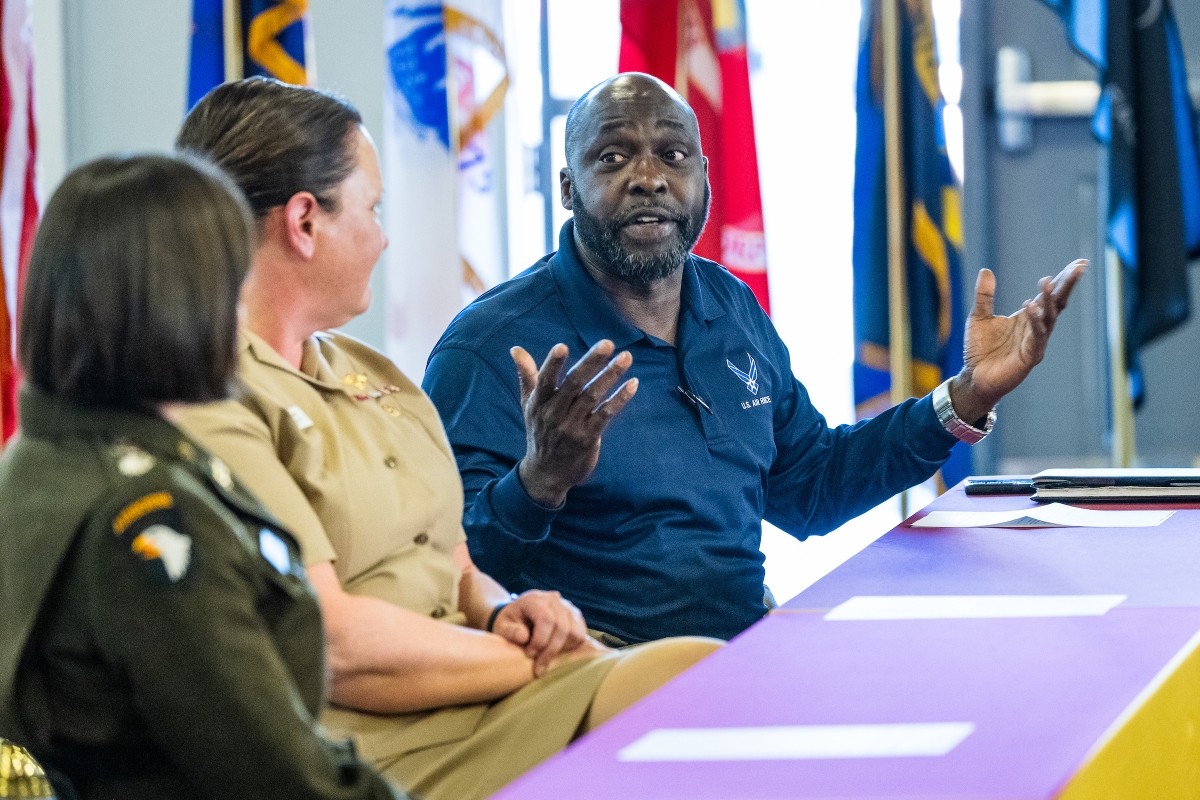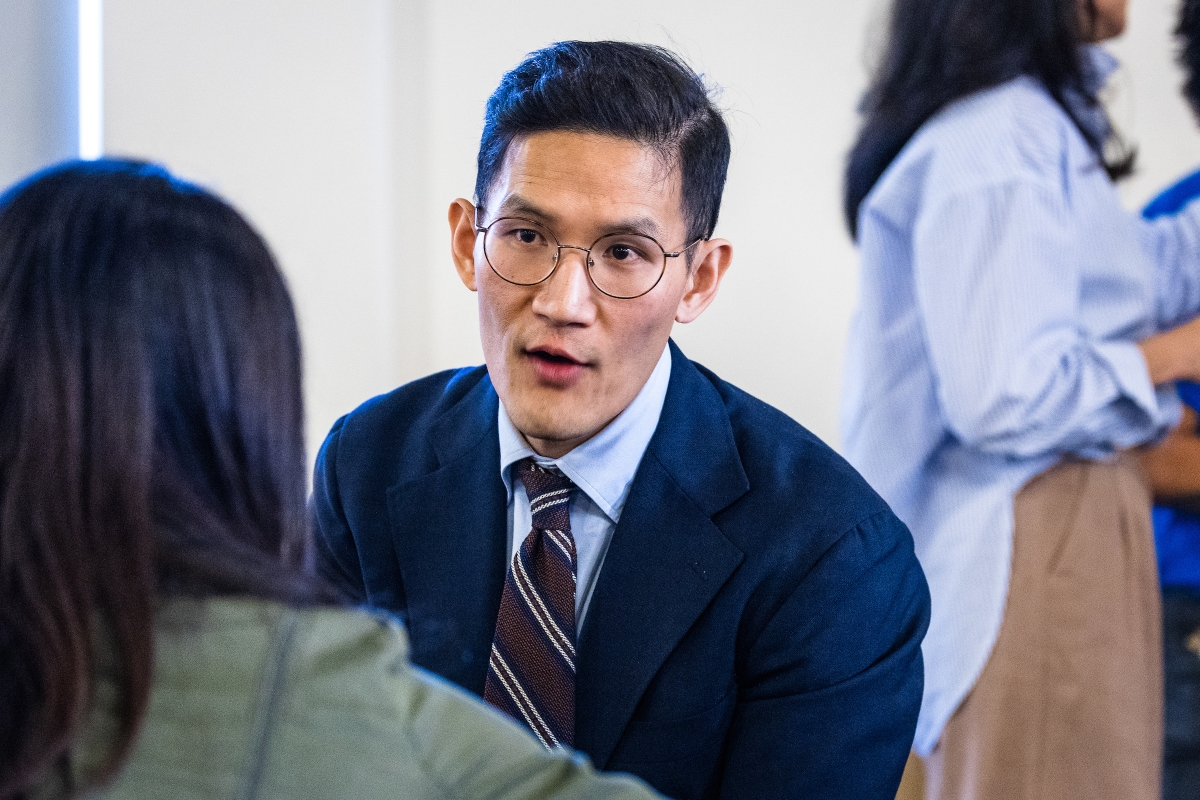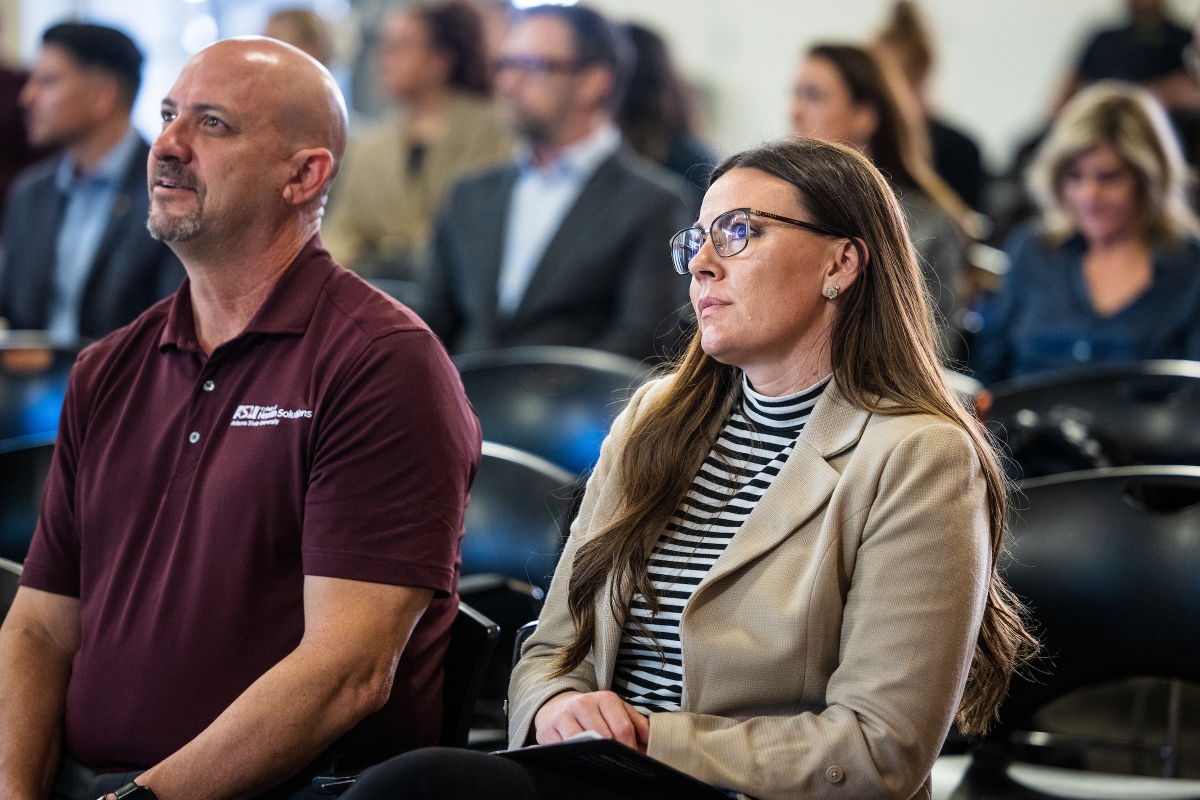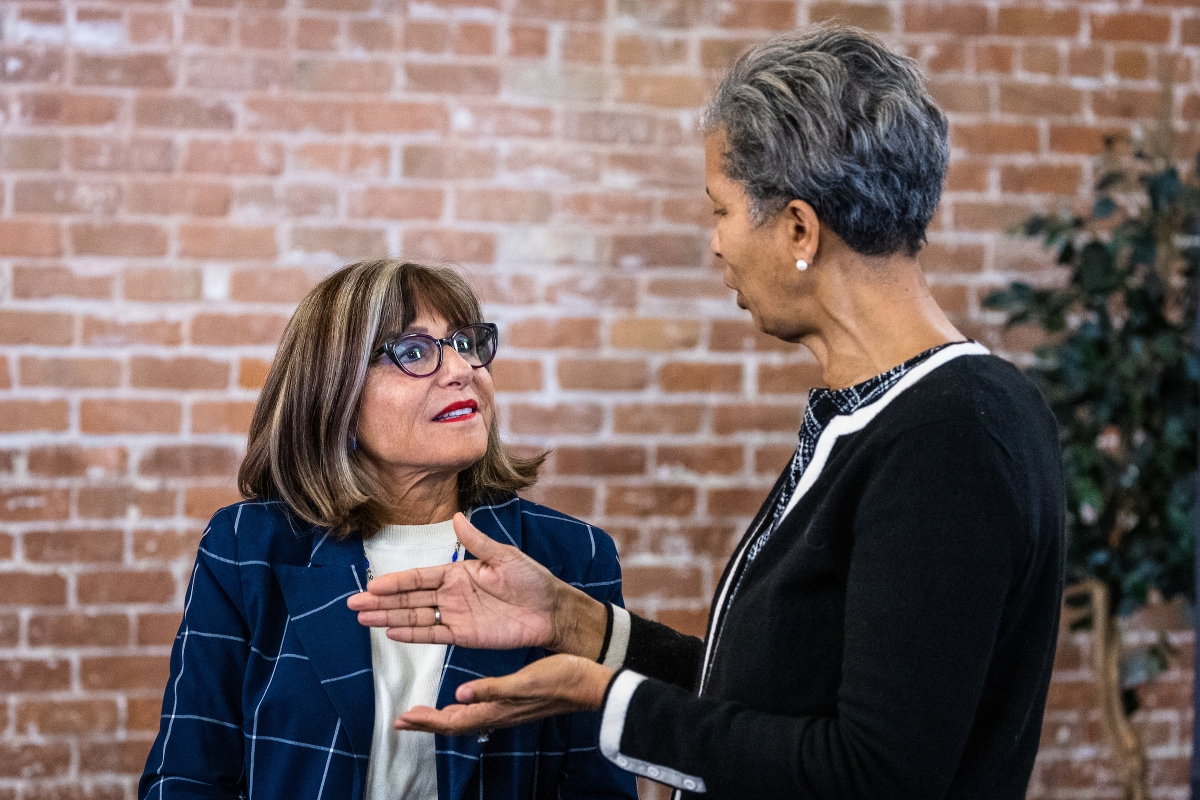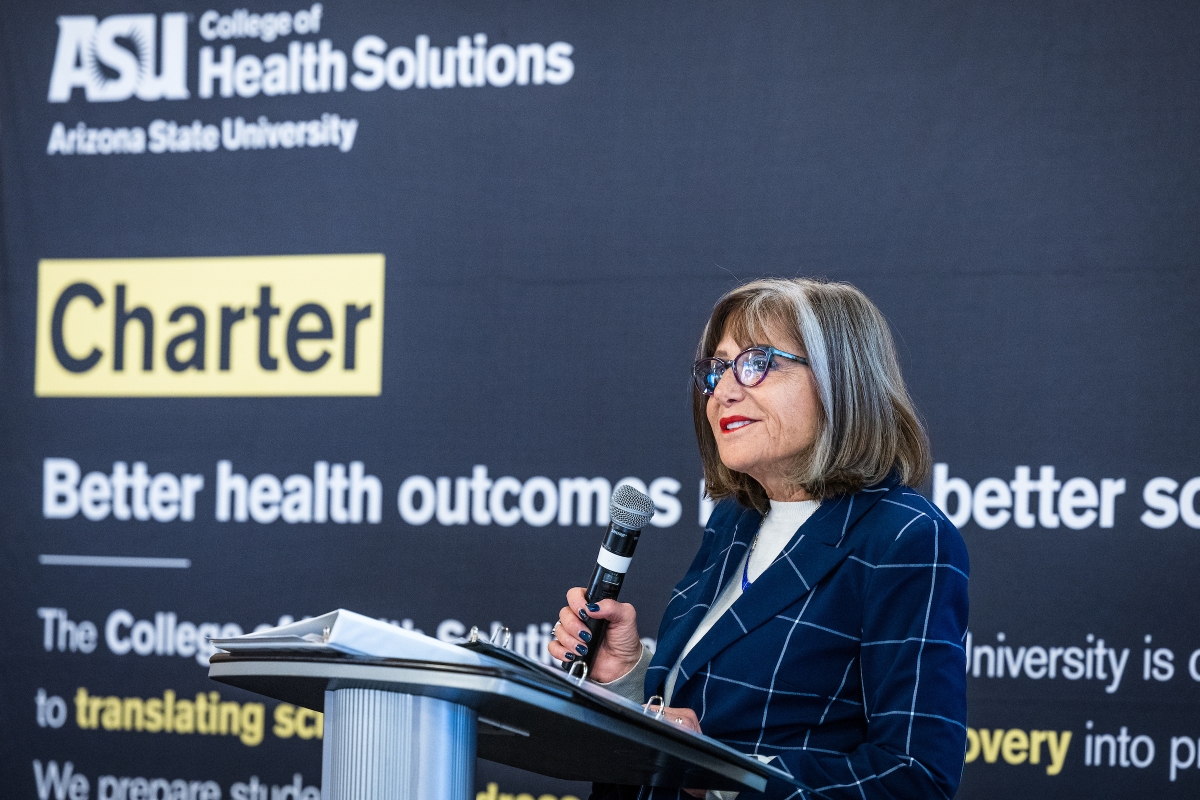College of Health Solutions launches veterans resilience program
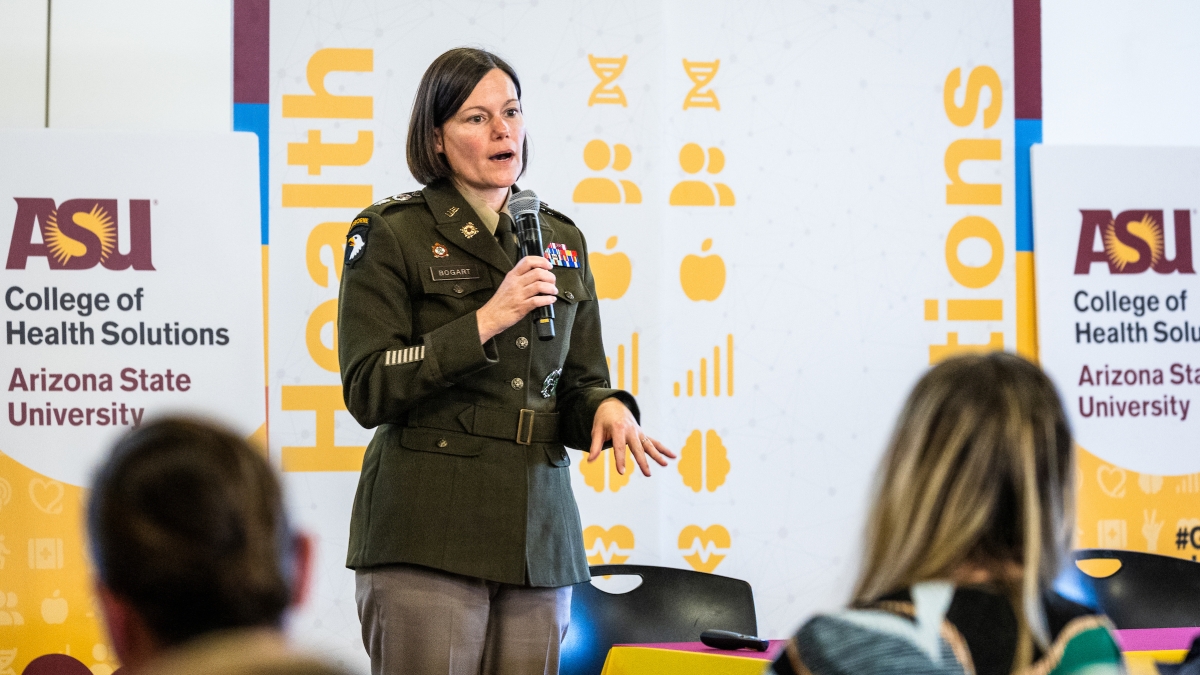
Army Lt. Col. Tammy Bogart, commander of the Phoenix Recruiting Battalion, speaks at the launch of the ASU College of Health Solutions’ Military and Veteran Resilience and Health Collaborative on Thursday, Jan. 18, at the A.E. England building in downtown Phoenix. Photo by Charlie Leight/ASU News
Shortly after Deborah Helitzer became the dean of the College of Health Solutions at Arizona State University, she met a PhD student who was studying traumatic brain injuries.
Their conversations led Helitzer to become even more interested in veterans’ health, and on Thursday at the A.E. England Building on ASU’s Downtown Phoenix campus, the College of Health Solutions officially launched the Military and Veterans Resilience and Health Collaborative (MVRHC), a program designed to bridge the gap between research and practical solutions and support the military-connected and first responder community.
“It became clear to me that our college had a lot to contribute to military and veteran health, whether through our expertise in exercise, science, nutrition, hydration, sleep or mental health resilience,” Helitzer said. “In order to more effectively support health solutions for those who serve, we have created the initiative.
“This collaborative will serve as a connector and a convener for partners to collaborate, innovate and accomplish more together than any of us can do alone.”
Rachel Larson, director and clinical associate professor the College of Health Solutions, said the college will work with its existing partnerships and new partnerships — including the Department of Defense, local police and fire departments, and the Arizona Coalition for Military Families — to focus on four areas of veterans’ health.
Increase eligibility to serve
According to the Pentagon, 77% of young Americans would not qualify for military service due to health issues such as weight, asthma, mental illness and drug use.
Larson said the College of Health Solutions is working with Luke Air Force Base to develop a course that will teach the basic principles of physical activity, nutrition, sleep and resilience. At the end of each semester, students will be required to take the Air Force physical fitness test.
“The goal is to empower individuals to adopt a more fit and healthy lifestyle,” Larson said.
The college has also launched a course called Strength and Conditioning for the Tactical Performer. The course, which is an elective within The College of Liberal Arts and Sciences, is designed for students to gain an understanding of the unique needs for military personnel and first responders.
Katrina Hill, a Navy captain, said in a panel discussion that efforts by ASU and other universities and organizations to improve the fitness of young people is critical because “we rely on the population of our country to supply our military, which is a great American idea. It’s your choice to join.”
Optimizing health and human performance
Larson said the College of Health Solutions is embarking on a three-year project aimed at increasing overall health and decreasing negative behaviors in military settings. The project, in partnership with the Arizona Army National Guard, includes student interns who — starting in the fall of 2024 — will assist the National Guard in implementing a holistic health and fitness program.
The college is also addressing the mental health of military members, Larson said. It is exploring a partnership with the Department of Defense to increase the pipeline for mental health professionals working in a military setting through the placement of students doing their clinical rotations in the College of Health Solutions’ doctorate and behavioral health programs.
“We are working on addressing the unique challenges that exist across the life span of a veteran,” Larson said. “With this collaborative effort, we can achieve population and systems-level change for our nation’s service members and veterans.”
Successful and seamless transition
Larson said 24% of veterans are at an increased risk of a problematic transition from military to civilian life.
“We know that this is a crucial time and that there are multiple social and environmental factors that can significantly affect service members as they go through this transition,” Larson said. “Veterans suffer from disproportionately higher mental and physical chronic disease in comparison to the U.S. general population.”
Larson said the College of Health Solutions has been working with the Arizona Coalition for Military Families to identify risk-reduction strategies. In addition, it is using results from the Arizona Veteran Survey to develop strategies that help Arizona veterans and, through research funded by the U.S. Centers for Disease Control and Prevention, has identified ZIP codes across the state that are at a higher risk for veteran suicides.
“Our goal is not to just develop intervention strategies, but to develop upstream prevention programming,” she said.
Invisible wounds
A critical component of MVRHC is its partnership with Home Base, a Massachusetts-based organization that is dedicated to healing the invisible wounds of veterans, service members and members of military families.
Larson said ASU’s partnership will center on Home Base’s free, 90-day Warrior Health and Fitness Program, which is designed to improve the physical health and well-being of veterans through supervised exercise, nutrition, stress management, etc.
The College of Health Solutions has built a space in its downtown Health North building to house the program and will staff it with a strength and conditioning coach, a nutritionist/dietitian as well as students who can help with the fitness sessions or shadow the dietitian. It is also setting up formalized internships for students in its Sports Science and Performance Programming bachelor’s program as well as its Strength and Conditioning master’s program.
Larson said the college is also considering a cohort program for its tribal partners throughout Arizona. The cohorts could consist of female veterans, family members, or any group of military members or veterans who could not only benefit from the Warrior Health and Fitness program but also the social support offered.
Everything the College of Health Solutions is doing in MVHRC, Helitzer said, lives up to ASU’s charter, which states that it assumes “fundamental responsibility for the economic, social, cultural and overall health of the communities it serves.”
“Our mission is to prepare the health workforce to serve the health needs of the entire community,” Helitzer said. “In order to accomplish that, it’s especially important for us to support the health of those individuals who also serve the community — the first responders, the active military, veterans, the caregivers and community supporters.
“Most of you who are here today either have served or are connected to someone who served," she said to the audience during the launch event. "I’m very appreciative of the commitment that you, your loved ones and so many other people make to protect our country. That’s the reason I’m so pleased to make (MVHRC) a strategic initiative of our college.”
More Health and medicine

Bird flu: Your questions on symptoms, spread and safety answered
Bird flu is no longer only “for the birds.”Infections have expanded beyond wild birds and poultry to a range of animals — from mice to mountain lions, dairy cows to domestic cats, and polar bears to…

Making medicine side-effect free
Many drugs that address medical conditions can come with serious side effects. In drug commercials, the litany of potential side effects is often longer than the benefits being touted. Carl…

Diagnostic research happening at ASU focused on detecting diseases earlier to save lives
It was one of America’s founding fathers, Benjamin Franklin, who may have foreshadowed today’s health care innovation when he quipped the adage: An ounce of prevention is worth a pound of cure.In…


